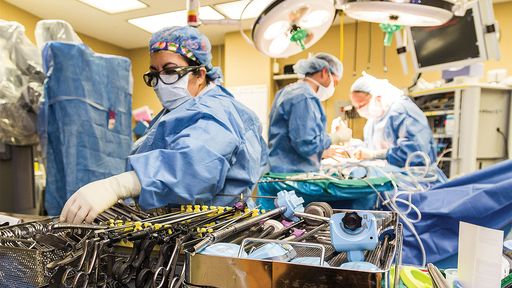
Compared with classic open procedures or laparoscopy, robotic-assisted colorectal surgery allows for minimally invasive, highly accurate procedures, which have been shown to have higher functional outcomes, according to a meta-analysis published last year in Surgical Endoscopy (2021;35[1]:81-95).
In the combined analysis of more than 24,000 patients, individuals who received robotic-assisted rectal resection were found to have a lower rate of urinary retention and ileus and higher quality of life when compared with
laparoscopic surgery.
“Robotic-assisted surgery provides the highest level of dexterity and a nearly three-dimensional view so we can better see the patient’s anatomy,” said Peter M. Kaye, MD, a colon and rectal surgeon at Englewood Health. “The surgery is less invasive, there is less pain and there is less time spent in the hospital.”
A dedication to the skilled use of emerging surgical technologies, as well as a strong multidisciplinary team approach, has allowed Englewood Health to offer cutting-edge therapies for patients with colorectal and digestive cancers.
The team at Englewood Health has completed more than 1,000 robotic resections for cancer. “We are the most experienced robotic colorectal surgeons in the area,” Dr. Kaye said. “This is what we’re trained to do.”
One important benefit of the robotic approach is the decreased rate of conversion to an open procedure, which in turn reduces postoperative complication rates and allows for a faster interval to completing chemotherapy (Ann Laparosc Endosc Surg 2020;5:9). Being able to perform complex surgeries in a minimally invasive way also benefits patients by decreasing the need for devices, such as colostomy bags.
“Very few surgeons have the technical ability to conduct sphincter-sparing surgery,” said Anna Serur, MD, the chief of colon and rectal surgery at Englewood Health (J Gastrointestinal Surg 2014;18[7]:1358-1372). “Fortunately, we have the special expertise to do these challenging procedures.”
Drs. Serur and Kaye also emphasized the importance of Englewood Health’s strong, multidisciplinary approach to managing patients’ cancers.
“We work very closely with a patient’s medical oncologist, radiation oncologist, with all of the specialties involved in the patient’s care,” Dr. Kaye commented.
Dr. Serur agreed that the team approach in the cancer center is part of what makes Englewood Health stand out. “We take pride in providing excellent care and outcomes,” she said. “We use the latest techniques and medicines, and follow best practices and national recommendations as they are released. We provide our patients with an experience that is special.”
Posted August 20, 2021
